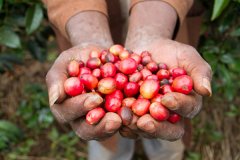One cup of freshly brewed coffee a day is effective in protecting the liver, canned coffee and instant coffee are ineffective.

Japanese researchers have found that drinking a cup of freshly brewed coffee a day can improve liver function in patients with chronic hepatitis C, and that the more they drink, the more effective it is to protect the liver. But it should be noted that canned coffee drinks, instant coffee and decaffeinated coffee have no hepatoprotective effect.
Researchers at the affiliated Hospital of Osaka City University in Japan have found that drinking more than one cup of freshly brewed coffee a day can improve liver function in patients with chronic hepatitis C. the study was published in the December 11, 2013 issue of the American academic journal PLoS one.
The affiliated Hospital of Osaka City University investigated the relationship between the number of ALT enzymes (the number of ALT enzymes increases with the injury of hepatocytes, which is usually used as an indicator of liver function) and the frequency of coffee drinking in 376 patients with chronic hepatitis C at the age of 20 to 80 years. The results showed that most of the patients who drank more than one cup of freshly brewed coffee a day for a year maintained their ALT enzyme levels in the normal range compared with those who did not drink. And the more coffee you drink, the more effective it is to protect the liver. The researchers also found that drinking canned coffee drinks, instant coffee and decaffeinated coffee had no corresponding hepatoprotective effect.
Extended reading: what are the ingredients in roasted coffee beans, and what are their effects on the human body?
Caffeine: caffeine is the most eye-catching of all the ingredients in coffee. It belongs to a kind of phytoxanthine (animal muscle component). It has the same properties as theophylline contained in cocoa, green tea contains the same theophylline, and the percentage of reduction after baking is very small. Caffeine has a very extensive effect. It will affect various parts of the human brain, heart, blood vessels, gastrointestinal tract, muscles and kidneys. The right amount of caffeine will stimulate the cerebral cortex, promote sensory judgment, memory and emotional activity, and make the myocardial machinery more active. Vasodilation enhances blood circulation and improves metabolic function. Caffeine can also reduce muscle fatigue and promote digestive juice secretion. In addition to this, because it also promotes the kidney function to help the body expel excess sodium ions (chemicals that hinder the metabolism of water molecules), caffeine will not accumulate in the body like other narcotic and excitant substances (narcotic drugs, paint solvents, stimulants, etc.) and will be excreted in about two hours. The biggest bitterness of ─ in coffee flavor is caused by caffeine.
Tannic acid: after extraction, tannin will turn into a yellowish powder, which can easily blend into water. After boiling, it will decompose and produce pyrosylic acid, which will make the coffee taste worse. If the coffee is soaked and left for several hours, the color of the coffee will become stronger than when it was just soaked. And it is also less tasty, so there is the saying that "it is best to drink it as soon as possible."
Fat: the fat contained in coffee plays a very important role in flavor. It is found that there are many kinds of fat in coffee, the most important of which are acidic fat and volatile fat. Acidic fat means that there is acid in fat, and its strength varies with different types of coffee, and volatile fat is the main source of coffee aroma. Once the fat contained in roasted coffee beans comes into contact with the air, chemical changes may occur and the taste and flavor will become worse.
Important Notice :
前街咖啡 FrontStreet Coffee has moved to new addredd:
FrontStreet Coffee Address: 315,Donghua East Road,GuangZhou
Tel:020 38364473
- Prev

The trend of China's coffee industry is to get rid of the situation of pure raw materials.
The trend of China's coffee industry, represented by Yunnan, China's coffee industry has once again encountered market cycle fluctuations. The government, enterprises and Cajun must take the initiative to turn the crisis into an opportunity. Li Ziliang, a reporter from Newsweek / Outlook Newsweek, entered November. Yunnan Province, China's largest coffee producing area, is about to usher in the harvest season. Pu'er, Dehong and Baoshan are the main coffee producing areas.
- Next

Italian blend of coffee beans ESPRESSO
I bought two kinds of beans in NAP CAFE. Because the freshly roasted coffee beans have a very short shelf life, it is not advisable to buy more beans, each for only half a pound. One is the Indonesian Sumatra gold Mantenin, a single product of beans, which is suitable for making a single product of coffee by manual filtration. This is the kind of bean I tried by hand yesterday. Today, try another kind of Italian beans, deep baked, beans are more
Related
- Beginners will see the "Coffee pull flower" guide!
- What is the difference between ice blog purified milk and ordinary milk coffee?
- Why is the Philippines the largest producer of crops in Liberia?
- For coffee extraction, should the fine powder be retained?
- How does extracted espresso fill pressed powder? How much strength does it take to press the powder?
- How to make jasmine cold extract coffee? Is the jasmine + latte good?
- Will this little toy really make the coffee taste better? How does Lily Drip affect coffee extraction?
- Will the action of slapping the filter cup also affect coffee extraction?
- What's the difference between powder-to-water ratio and powder-to-liquid ratio?
- What is the Ethiopian local species? What does it have to do with Heirloom native species?

